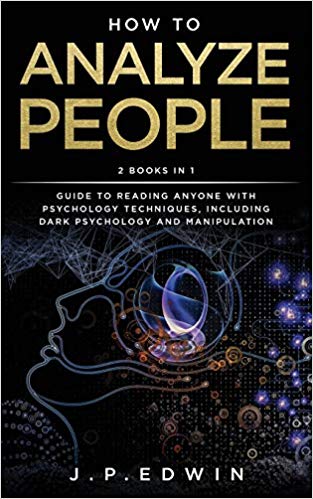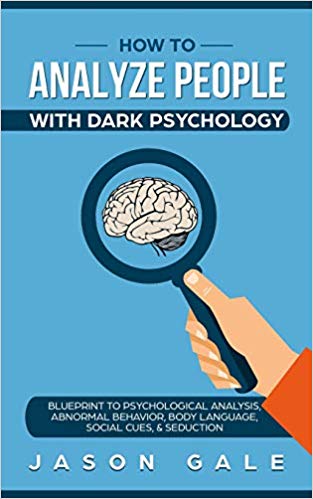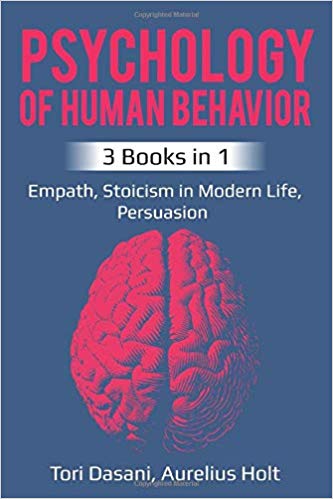2019 was an excellent year for psychology books. In researching the hundreds of psychology titles released last year, we were especially interested in books which had hit the bestseller lists, become runaway hits, and won awards. We also consulted Amazon and Barnes & Noble to see which books had sold best and received the most positive reviews from real, everyday readers. The result is a fascinating collection of memoirs, how-to guides, academic essays and textbooks. Keep scrolling for the 30 best psychology books of 2019.
Abnormal Psychology
Susan Nolen-Hoeksema
 March 28, 2019
March 28, 2019
The eighth edition of Susan Nolen-Hoeksema’s Abnormal Psychology was released in 2019. Like previous editions, this textbook brings readers up to date on the latest research regarding various psychological disorders. Nolen-Hoeksema’s books have been applauded for their compassion towards those living with the disorders discussed, and for the ways in which the book personalizes the human experience.
The Art of Decision Making: How to Move from Indecision to Smart Choices
Joseph Bikart
 July 8, 2019
July 8, 2019
Every facet of our day-to-day lives depends on the decisions we make, and yet many of us make decisions with fear. Why are some people so much better at committing to a choice than others? Drawing from psychology, neurology, philosophy, literature, and even theology, author Joseph Bikart explores in The Art of Decision Making the intricacies of decision making, the fears that often accompany the decision-making process, and the true power of committing to a choice.
Attention Seeking
Adam Phillips
 July 3, 2019
July 3, 2019
Adam Phillips has been called “Britain’s pre-eminent psychoanalyst.” In Attention Seeking, Phillips provides readers with an introduction to our attention — what attracts it, how we spend it, and what it tells us about ourselves.
Becoming Us: Using the Enneagram to Create a Thriving Gospel-Centered Marriage
Beth McCord and Jeff McCord
 October 1, 2019
October 1, 2019
Beth and Jeff McCord, authors of the popular book Your Enneagram Coach, now discuss the Enneagram in terms of marriage. Specifically, Becoming Us helps people to discover their unique personality type, then apply that knowledge to their relationship. Woven throughout are tidbits of wisdom from the Gospel that help explain why spouses behave differently. Some of the topics covered include:
- ways to defuse conflict before it begins
- affirm each other meaningfully
- enjoying one’s spouse all over again.
Best Self: Be You, Only Better
Mike Bayer
 January 8, 2019
January 8, 2019
Best Self, written by life coach Mike Bayer, hit the New York Times bestseller list almost as soon as it was released. Bayer asks readers to ask themselves who they really want to be, if they’re really living every day as their best self, and myriad related questions. Then, Bayer presents the Seven SPHERES of Life:
- social
- personal health
- education
- relationships
- employment
- spiritual development
Through an explanation of each of these Seven SPHERES, Bayer presents accessible ways we can ignite our desire for change, embrace authenticity, and live a passionate life to the fullest.
Co-Creative Transactional Analysis: Papers, Responses, Dialogues, and Development
Graeme Summers and Keith Tudor
 June 12, 2019
June 12, 2019
“C0-Creative Transactional Analysis” refers to a particular branch of psychology emphasizing the “co-” — that is, “mutual” or “joint” — aspect of professional, and by extension, personal relationships. Co-Creative Transactional Analysis is the result of 15 years of research by authors Graeme Summers and Keith Tudor. The book summarizes the authors’ revolutionary findings regarding transactional analysis.
Dark Psychology: The Ultimate Guide to Find Out the Secrets of Emotional Influence, Hypnotism, Deception, Covert NLP, and Brainwashing to STOP Being Manipulated and Foresee Human Behavior
Michael Leary and Gillian Edward
 June 21, 2019
June 21, 2019
Declared a “guidebook,” Dark Psychology explains how manipulation, persuasion, deception, brainwashing, hypnosis, and seduction work on the human mind. The authors explain how these things are used, either by us or against us, in a variety of scenarios. Topics covered include:
- how emotional influence is used against a victim
- the six main principles of persuasion
- how to deceive others
- to detect when someone is manipulating you and how to defend yourself against manipulation.
Dark Psychology Secrets: The Art of Reading People: The Ultimate Guide to Learn How to Analyze People, Read Body Language and Understand Human Behavior through Speed Reading People Techniques
Michael Davis
 August 19, 2019
August 19, 2019
According to author Michael Davis, dark psychology is one of the main methods one can use to reach their lifelong goals and dreams. In Dark Psychology Secrets, Davis explains different personality types. He breaks down verbal and nonverbal communication. He sheds light on how someone can detect deception. He also outlines exactly how to analyze other people one might want to use for manipulation.
For the Love of Men: A New Vision for Mindful Masculinity
Elizabeth Plank
 September 10, 2019
September 10, 2019
2019 was the year of #MeToo, and much was discussed about men and masculinity. In For the Love of Men, author and award-winning journalist Liz Plank investigates the history of masculinity. She explores how being a man in the world has evolved in recent years, and provides actionable steps for being a man in modern times. Since its release, the book has been called “smart,” “insightful,” and “deeply researched.”
Foundations in Music Psychology: Theory & Research
Peter Jason Rentfrow and Daniel J. Levitin (Editors)
 March 11, 2019
March 11, 2019
Editors Peter Jason Rentfrow and Daniel J. Levitin are leaders in the field of music theory. In Foundations in Music Psychology, they’ve compiled a series of essays covering the latest theories and research in music perception and cognition. The essays are written by eminent scholars from a range of disciplines, and employ a variety of methodologies. The book is conveniently separated into four sections:
- music cognition
- music
- neurobiology and evolution
- musical training
- ability and performance
- musical experience in everyday life.
Good Habits, Bad Habits: The Science of Making Positive Changes That Stick
Wendy Wood
 October 1, 2019
October 1, 2019
Called a “landmark book,” Good Habits, Bad Habits” talks about how we form habits, and what we can do with this knowledge to make positive change. Wood points out that a whopping 43% of our day is spent doing things subconsciously. Yet when we hope to change something about ourselves, we rely on our barely-used willpower. She then draws on nearly 30 years of research to explain the science behind how we form habits and how we can change the way we behave.
How to Analyze People: 2 Books in 1 — Guide to Reading Anyone with Psychology Techniques, Including Dark Psychology and Manipulation
J.P. Edwin
 July 21, 2019
July 21, 2019
According to its Amazon description, J.P. Edwin’s How to Analyze People: 2 Books in 1 is “very important if you want to take the lead in improving your relationship, making a perfect first impression on any person that you meet and also be the lead in every social event.” Some of the of the concepts discussed include:
- how to interpret body language cues to your advantage
- the main elements of the 16 personality types
- sales and manipulation
- how to interpret verbal communication, to name but a few.
How to Analyze People With Dark Psychology: Blueprint to Psychological Analysis, Abnormal Behavior, Body Language, Social Cues, and Seduction
Jason Gale
 April 3, 2019
April 3, 2019
According to author Jason Gale, “it’s a fact that manipulators gain control over their targets through subtle social cues and persuasion tactics.” In How to Analyze People With Dark Psychology, Gale informs readers how to:
- identify people with malicious intent
- spot persuasion tactics
- fully understand the art of seduction
Some of the topics covered include:
- dark psychology vs. normal psychology
- the art of persuasion
- how to identify manipulation.
How to Be a Dictator: The Cult of Personality in the Twentieth Century
Frank Dikotter
 December 3, 2019
December 3, 2019
In How to Be a Dictator, author Frank Dikotter provides readers with a sweeping study of twentieth-century dictators and the development of the modern cult of personality. He examines the cults and propaganda surrounding such 20th-century dictators as Hitler, Stalin, Mao Zedong, and Kim Il Sung. He discusses the ways in which the dictatorships of these men have ultimately led to the rise of 21st-century leaders like Vladimir Putin, Recep Tayyip Erdogan, and Xi Jinping.
Introducing Psychology: The Complete Guide to Understand Body Language, Learn Persuasion, and Influence People Using Emotional Intelligence and Cognitive Behavioral Therapy
Paul H. Ciccarelli
 March 6, 2019
March 6, 2019
Each person’s personality is unique, and it’s helpful for a person to learn how their personality came to be. In fact, understanding psychology and our personality can help us to more easily achieve our goals. In Introducing Psychology, Ciccarelli offers clear-cut descriptions about various brain processes. He discusses the psychology of selling and the psychology of achievement. He also provides a vivid description of the link between the mind and the body as relating to the achievement of goals.
Introducing Psychology: Learn the Basics of Human Behavior, Develop a Strong Mindset for Success, Discover the Positive Thinking, Stop Procrastination, Motivate Yourself and Boost Your Confidence
Daniel Anderson
 February 22, 2019
February 22, 2019
Daniel Anderson’s Introducing Psychology is meant for anyone looking to positively readjust their emotional state. Anderson uses clear explanations to provide readers with an understanding of the brain’s processes. He shows how this understanding can be used to:
Featured Programs
- become more productive
- stop procrastinating
- motivate oneself
- think more positively.
Jung and Philosophy
Jon Mills (Editor)
 May 8, 2019
May 8, 2019
The works of Carl Jung are well known among psychologists, but few psychologists have taken the time to understand Jung’s philosophy. According to author Jon Mills, exploring the philosophical implications of Jung’s teachings is vital. In Jung and Philosophy, a group of prominent philosophers unpack the philosophical consequences of Jung’s thought. They then apply those consequences to traditional topics covered in the humanities and social sciences, including:
- the mind
- culture
- human nature.
Manipulation and Persuasion: Learn How to Influence Human Behavior, Dark Psychology, Hypnosis, Mind Control and Analyze People
Joseph Sorensen
 August 27, 2019
August 27, 2019
In the first pages of Manipulation and Persuasion, Joseph Sorensen asserts that “it is possible to read and understand the personality of a person even before you talk to them.” Throughout his book, Sorensen describes the many tips and techniques used to:
- read a person correctly
- understand their personality
- use that information to influence them.
Maybe You Should Talk to Someone: A Therapist, HER Therapist, and Our Lives Revealed
Lori Gottlieb
 April 2, 2019
April 2, 2019
Not all great psychology books need be heavy and academic, as proven by Lori Gottlieb and her instant bestseller Maybe You Should Talk to Someone. In this heartwarming and funny book, Gottlieb describes the day a crisis caused her world to come crashing down. Despite being one of Los Angeles’ most renowned therapists, Gottlieb begins to see Wendell, a quirky yet experienced therapist “who seems to have come straight from Therapist Central Casting.” Though first and foremost a deeply personal story, Gottlieb also offers her readers an examination of the truths and fictions we tell ourselves as we battle love and desire, guilt and redemption, meaning and morality, terror and courage.
Kirkus calls this book “An irresistibly addictive tour of the human condition”
Narrative Economics: How Stories Go Viral and Drive Major Economic Events
Robert J. Shiller
 October 1, 2019
October 1, 2019
In 2019, Nobel Prize-winning economist and New York Times bestselling author Robert Shiller released his new book, Narrative Economics: How Stories Go Viral and Drive Major Economic Events. In this bestseller, Shiller offers readers a new way to think about the economy and economic change. He asserts that studying popular stories that affect individual and collective economic behavior has the power to predict, prepare for, and lessen the damage of :
- financial crises
- recessions
- depressions
- other major economic events
Shiller illustrates his text with real-life examples ranging from internet troll farms attempting to influence foreign elections to the confidence (and panic) surrounding Bitcoin.
Positive Psychology: The Science of Happiness and Flourishing
William C. Compton and Edward L. Hoffman
 February 18, 2019
February 18, 2019
Positive Psychology is a textbook written by William C. Compton and Edward L. Hoffman. Highly engaging and totally up-to-date, the text examines how positive psychology “applies to stressors and health within such traditional research areas as developmental, clinical, personality, motivational, social, and behavioral psychology.” Other topics covered include:
- emotional states
- research and theory on positive traits
- a look at the future of positive psychology.
Psychology of Human Behavior: 3 Books in 1 — Empath, Stoicism in Modern Life, Persuasion
Tori Dasani and Aurelius Holt
 October 1, 2019
October 1, 2019
Psychology of Human Behavior is actually three books in one volume. The first, Empath, is subtitled “A Survival Guide for the Highly Sensitive Person.” It describes empathy as an emotional skill over which most humans have some control. In Stoicism in Modern Life, authors Tori Dasani and Aurelius Holt assert that a person’s happiness is entirely up to them. Finally, there’s Persuasion, in which Dasani and Holt describe the various techniques for employing dark psychology, manipulation, and deception.
Range: How Generalists Triumph in Specialized World
David Epstein
 May 28, 2019
May 28, 2019
Part psychology book and part business book, David Epstein’s Range shot to the #1 spot on the New York Times bestseller list. In it, Epstein examines the world’s most successful athletes, musicians, artists, inventors, forecasters, and scientists. He finds that in all of these fields it is the generalists — not the specialists — who excel. Epstein’s conclusions are fascinating, and include things like:
- “frequent quitters end up with the most fulfilling careers”
- “the most impactful inventors cross domains rather than deepen their knowledge in a single area”
- “failing a test is the best way to learn.”
Right Brain Psychotherapy
Allan N. Schore Ph.D.
 March 26, 2019
March 26, 2019
Allan N. Schore, Ph.D. is considered one of the most significant writers on the topic of emotion and the brain. In Right Brain Psychotherapy, Schore explores the adaptive functions of the emotional right brain. He offers evidence that emotional interactions reflect right-brain-to-right-brain affective communication. Right Brain Psychotherapy has been called “essential reading for those trying to understand one-person psychology as well as two-person psychology relationships.”
Separating From Service: The Mental Health Handbook for Transitioning Veterans
Eric Burleson
 February 27, 2019
February 27, 2019
Transitioning from the military isn’t as simple as it sounds. In fact, it’s a big psychological change, as asserted by Eric Burleson in this book. Burleson outlines the unique psychological challenges veterans face as they transition from the military. It offers an actionable framework for addressing those challenges based on research in neuroscience, psychiatry, and clinical psychology.
The Stoic Challenge: A Philosopher’s Guide to Becoming Tougher, Calmer, and More Resilient
William Braxton Irvine
 September 3, 2019
September 3, 2019
The Stoic Challenge is described as “a practical, refreshingly optimistic guide that uses centuries-old wisdom to help us better cope with the stresses of modern living.” Author William Braxton Irvine combines insights of the ancient Stoics with modern-day psychological research to show how humans can “turn any challenge on its head.”
Talking to Strangers: What We Should Know About the People We Don’t Know
Malcolm Gladwell
 September 10, 2019
September 10, 2019
Malcolm Gladwell’s books are immensely popular and fascinating. Talking to Strangers is no exception. In this New York Times bestseller, Gladwell asks questions like:
- “How did Fidel Castro fool the CIA for a generation?”
- “Why are campus sexual assaults on the rise?”
- “Why did Neville Chamberlain think he could trust Adolf Hitler?”
In his answers to these questions and more, Gladwell asserts that we often use the wrong tools and strategies to try to make sense of people we don’t know.
TeamMakers: Positively Impacting the Lives of Children Through District-Wide Dreaming, Collaborating, and Change
Laura Robb and Evan Robb
 July 29, 2019
July 29, 2019
In TeamMakers educators Laura and Evan Robb use elements of psychology to outline their vision for a reimagined education system based on effective dreaming and planning. The book is aimed at educators and school district leaders, and includes a slew of how to’s and practical suggestions.
Things No One Else Can Teach Us
Humble the Poet
 October 15, 2019
October 15, 2019
Humble the Poet is so much more than a bestselling author. He’s a rapper, poet, spoken word artist, and social media influencer. In Things No One Else Can Teach Us, Humble presents the message that we do not need to allow the inevitable setbacks, disappointments, and failures to incapacitate us. Through principles of psychology and stories from his own life, Humble shows how each of us can better handle any challenges that may arise.
Widen the Window: Training Your Brain and Body to Thrive During Stress and Recover from Trauma
Elizabeth A. Stanley Ph.D.
 September 24, 2019
September 24, 2019
Elizabeth A. Stanley, Ph.D. has been called a “pioneering researcher” in the field of psychology. In Widen the Window Stanley offers a new understanding of stress and trauma. She presents a series of effective tools for healing and thriving. Stanley’s book has been called “groundbreaking.”
Related Resources:
